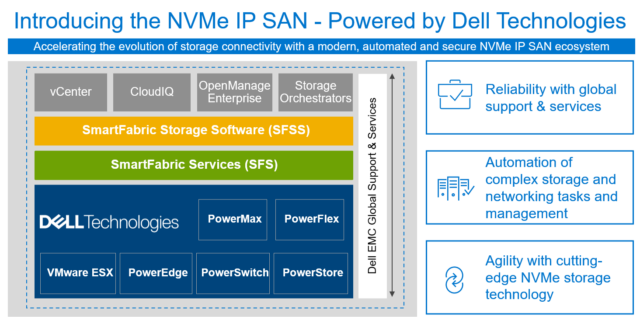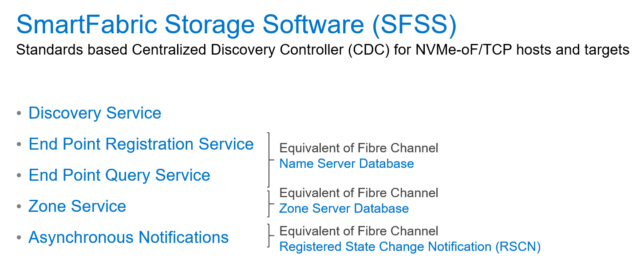A new business paradigm is driving the need for high-speed, software-defined storage connectivity. One in which modern multi-cloud applications use disaggregated infrastructure and where data moves on-demand to where it’s needed most, at the edge. NVMe over Fabrics are ideal for meeting the needs of these next generation workloads and those of existing applications and environments, by delivering improved performance, lowering latency, and improving efficiency.
As we’ve explored the various NVMe over Fabrics transport protocols, we’ve concluded that each is best suited for certain environments and use cases. For our initial release, we decided to focus on NVMe/TCP because it performs as well as NVMe/FC but scales to much higher speeds at significantly lower cost. Its biggest strength is its ability to leverage the standard networking infrastructure and the ongoing investments being made to Ethernet, especially in support of cloud connectivity that is constantly pushing the need for more bandwidth and lower latency.
 NVMe/TCP also does not require any specialized network configuration (i.e., to support lossless behavior), nor is it susceptible to congestion spreading. The biggest downside? NVMe-oF was difficult to manage at scale due to its reliance on a Direct Discovery (iSCSI-like) management model. To help address this limitation we have been working relentlessly with industry organizations like VMware to deliver Centralized Discovery to NVMe/TCP, because it allows storage connectivity to be efficiently automated at scale. In addition, we not only want to allow NVMe/TCP to be a drop-in alternative for FC, we want them to co-exist (run in parallel) with any other storage protocol making the transition to NVMe-oF TCP/IP simple for Enterprises.
NVMe/TCP also does not require any specialized network configuration (i.e., to support lossless behavior), nor is it susceptible to congestion spreading. The biggest downside? NVMe-oF was difficult to manage at scale due to its reliance on a Direct Discovery (iSCSI-like) management model. To help address this limitation we have been working relentlessly with industry organizations like VMware to deliver Centralized Discovery to NVMe/TCP, because it allows storage connectivity to be efficiently automated at scale. In addition, we not only want to allow NVMe/TCP to be a drop-in alternative for FC, we want them to co-exist (run in parallel) with any other storage protocol making the transition to NVMe-oF TCP/IP simple for Enterprises.
To create this user experience, Dell continues to invest in NVMe IP SAN product capabilities and enhancements across the Dell Technologies’ portfolio of Storage, Networking and Compute including a new Centralized Discovery Controller called SmartFabric Storage Software (SFSS) that provides the intelligence for this automated experience.
This new NVMe IP SAN Dell portfolio becomes available for use on November 18, 2021, and along with it, we are announcing the following key innovations:
-
- SmartFabric Storage Software (SFSS) – Automates storage connectivity for your NVMe IP SAN. It allows host and storage interfaces to register with a Centralized Discovery Controller, enables storage administrators to create and activate zoning configurations and then automatically notifies hosts of new storage resources. Hosts will then automatically connect to these storage resources.
- PowerStore: NVMe/TCP protocol and SFSS integration – We have enabled our market leading Dell PowerStore storage array to use the NVMe/TCP protocol and it will support both the Direct Discovery and Centralized Discovery management models. PowerStore integration with SFSS is initially accomplished via the Pull Registration technique.
- VMware ESXi 7.0u3: NVMe/TCP protocol and SFSS integration – We have partnered with VMware to add support for the NVMe/TCP protocol as well as the ability for each ESX server interface to explicitly register discovery information with SFSS via the Push Registration technique. We have also updated our OMNI plugin to support configuration of SFSS from within vCenter.
- PowerEdge: ESXi 7.0u3 using NVMe/TCP has been qualified.
- PowerSwitch and SmartFabric Services (SFS): While out NVMe IP SAN solution will run over traditional fabric switches, implementing Dell PowerSwitch and SmartFabric Services (SFS) can be used to automate the configuration of the switches that make up your NVMe IP SAN. SFSS will eventually have an integration with SFS to create hardware enforced zones in future releases.
- PowerMax and PowerFlex (future): You can expect us to add support for NVMe/TCP to both our Dell PowerMax and PowerFlex over the next couple of releases.
SmartFabric Storage Software
SFSS can provide the same fabric services as FC on an IP based network by combining several subservices to create the equivalent functionality.
Finally, Dell, along with several other interested parties, know how important being able to boot from SAN is, and as a result we have been driving technical proposals intended to add support for this as well.
Performance – NVMe/TCP vs. iSCSI
As mentioned previously, we decided to implement NVMe/TCP first because we felt it was the best “general purpose” IP based storage protocol available. We also noticed that it could provide a tremendous performance boost when compared to iSCSI on ESX. For example, initial internal testing has provided the following results:
-
- IOPs – NVMe/TCP provided 2.5-3.5x the IOPs as iSCSI
- Latency – NVMe/TCP reduced latency by 70-75%
- CPU per IO – NVMe/TCP reduced CPU utilization by 40-50%
Ecosystem engagement
In addition to the work Dell has done to create NVMe standards that will ensure the NVMe IP SAN will remain open and interoperable, we’re also heavily investing in the NVMe-oF ecosystem in several important ways:
-
- Open Source CDC Client – Dell is currently the maintainer of the open source client that will be used by Linux distributions to support discovery automation. The client package (nvme-stas) will be available near the end of the year.
- Developer Enablement – Dell will facilitate the creation of a Github-based developer community that allows for sharing SFSS REST API documentation, a developer toolkit and useful scripts. There may even be a lite version of the SFSS itself, so developers can quickly get up to speed and start automating connectivity.
Dell Technologies is continuing our long history of helping to solve customer challenges with innovative solutions that are optimized, cost-effective, and easy to implement. It’s an exciting time as organizations small and large continue their journey of IT Transformation to help stay ahead of new demands on their infrastructures and services. These NVMe IP SAN innovations from Dell Technologies in storage connectivity automation are revolutionary and represent what we believe is the future of storage networking.
To find out more about Dell Technologies NVMe IP SAN solutions, please visit our SmartFabric Storage Software (SFSS) website.


